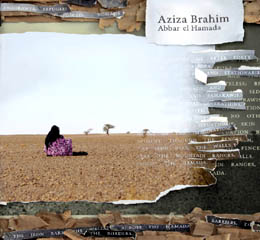|
Aziza Brahim - Abbar el Hamada
|
|
Aziza Brahim
Like a number of Sahrawi refugees, Brahim was educated in Cuba on scholarship, but she left her studies after seven years to take up a music career back in Algeria. In 2000 she moved to Spain, where she released her first solo recording, Mi Canto, in 2007. Her music reflects her diverse experiences. She writes songs in Spanish (learned in Cuba) and in Hassaniya, the Arabic dialect spoken in the Western Sahara as well as in Mauritania. Brahim is well grounded in the Sahrawi traditional music known as haul, where vocals are backed by the tbal drum (which Brahim plays) and the tidinit, the Sahrawi lute-like string instrument. Residence in Barcelona and involvement in the local and European world music scene has exposed her to a number of musical influences. On Abbar el Hamada, she is joined by percussionists Aleix Tobias (Spain), who studied drumming in Senegal, Gambia and Morocco, and Sengane Ngom, from Senegal. (Many diasporic Sahrawi musicians have taken up residence in Senegal.) Malian guitarist Kalilou Sangare and Barcelona musicians Ignasi Cussó on guitar and Guillem Aguilar on bass, who all worked with her on her previous album Soutak, round out the recording crew.
The result is a pleasingly diverse and varied mix. “La Cordillera Negra” (The Black Mountain Range), a song about migration across the desert from Sub-Saharan Africa to Europe, possesses the Afro-Cuban cadences of Mali great urban dance bands. It seems fitting that a Sahrawi woman who studied in Cuba would produce songs in the Afro-Cuban tradition together with artists from Malian and Senegalese. “Calles de Dajla” (Streets of Dajla) is a tribute to Dakhla, a city on the coast of Moroccan-occupied Sahara, which Brahim has never visited. Stylistically, it resembles the sounds of – to my mind unfortunately labeled – “genre” of desert blues, made famous by the likes of Malian guitarist Ali Farka Toure and the Touareg Malian band Tinariwen. (Brahim collaborated with Algerian Touareg musicians during her days in Algeria.) “Muros” (Walls) is a sad lament about, broadly speaking, the walls constructed around the globe to keep out migrants (on the US-Mexico border, Israel's “separation barrier,” the fortress surrounding Melilla, the Spanish enclave on Morocco's coast). More concretely, “Muros” refers to the 1600 mile-long berm of sand that Morocco constructed to keep refugees from returning to the Western Sahara.
Other songs celebrate the uprisings of Sahrawi youths living under occupation (“Intifada”), articulate Sahrawi desires for peace after forty plus years of exile (“Buscando el Paz” Looking for Peace), and testify to the role of Sahrawi women in the struggle for liberation and survival (“Baraka”). Whether they are doleful or inspirational, all the songs on the album, and Brahim's voice, are characterized by a light, dulcet ambience. In this they contrast with the gutsy, tough and at times raucous sounds of the Sahara's other celebrated female vocalist, the late Mariem Hassan (d. 2015), and Touareg groups like Tinariwen or Terakaft. The album's title song, Abbar el Hamada, is about crossing a section of the desert. The album cover would appear illustrate the theme, and shows Brahim seated in a stark, flat, rocky desert landscape whose horizon is only broken up by a handful of scraggly trees. The song's lyrics, however, stress the beauty of the desert, and that it is home for the nomadic Sahrawi peoples. The conditions faced by Sahrawis, whether under occupation, in the camps, or in the diaspora, are indeed tough, but Aziza Brahim's politically astute treatment of these conditions is consistently mellifluous. Somehow, she makes the “crossing” a sweet one. - Ted Swedenburg
Further reading:
© 2016 RootsWorld. No reproduction of any part of this page or its associated files is permitted without express written permission.
|

|
|
|